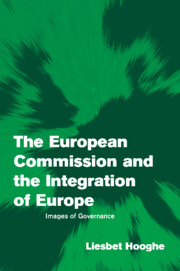Book contents
- Frontmatter
- Contents
- List of figures
- List of tables
- Preface
- Prologue
- 1 Preference formation in the European Commission
- 2 Men (and women) at Europe's helm
- 3 Images of Europe
- 4 Beyond supranational interest
- 5 Capitalism against capitalism
- 6 Principal or agent
- 7 Accommodating national diversity
- 8 Conclusion
- Appendix I Statistics
- Appendix II Description of independent variables
- Appendix III Survey material
- References
- Index
Preface
Published online by Cambridge University Press: 22 September 2009
- Frontmatter
- Contents
- List of figures
- List of tables
- Preface
- Prologue
- 1 Preference formation in the European Commission
- 2 Men (and women) at Europe's helm
- 3 Images of Europe
- 4 Beyond supranational interest
- 5 Capitalism against capitalism
- 6 Principal or agent
- 7 Accommodating national diversity
- 8 Conclusion
- Appendix I Statistics
- Appendix II Description of independent variables
- Appendix III Survey material
- References
- Index
Summary
The study of the European Union (EU) has vacillated between being a vanguard for theoretical innovation and a feast for area specialists. The turn of the century has been a time of connecting these two worlds.
This book on preferences in the European Commission is written for both generalists and EU area specialists. For EU students, I explore the beliefs of decision makers at the heart of Europe about who should govern, how, and over whom. These questions have structured political competition in Europe's national states over the past century and a half. They now shape EU politics. Scholars have begun to map contestation among public, parties, and private interests. But how do office holders in the European Union's central executive and administrative body, the European Commission, conceive of European integration? What kind of European Union do top Commission officials want? Should the European Union be supranational or intergovernmental? Should it promote market liberalism or regulated capitalism? Should the Commission be an executive principal or an administrative/managerial agent? Should it be a consociational or a Weberian organization?
Between 1995 and 1997, I set up camp in Brussels in order to ask these people what they think of the integration of Europe. These 137 interviews constitute the empirical bedrock of this book. The leadership of the Commission holds diverse, not unitary views. Contrary to conventional wisdom, I find that top officials are divided as sharply as national parties, governments, and national publics.
- Type
- Chapter
- Information
- The European Commission and the Integration of EuropeImages of Governance, pp. ix - xiiPublisher: Cambridge University PressPrint publication year: 2002

